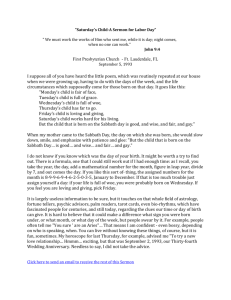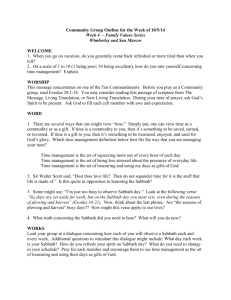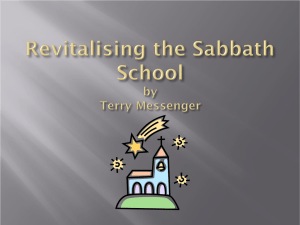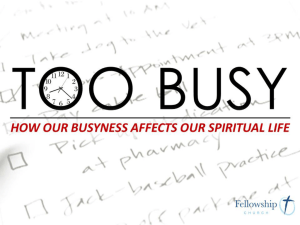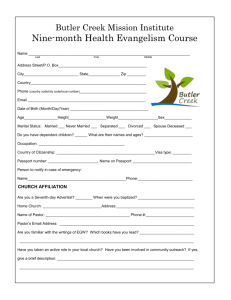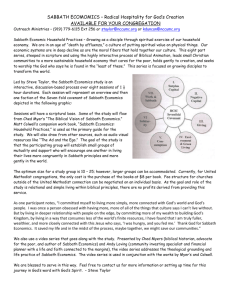Sabbath Week 5: Feasting
advertisement
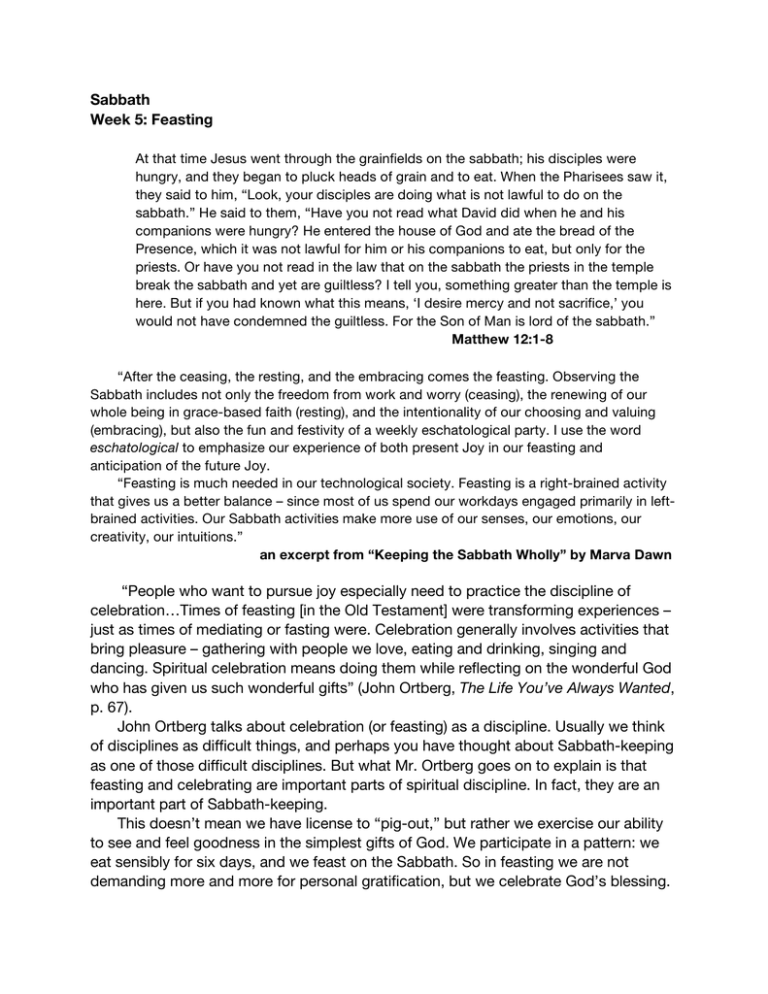
Sabbath Week 5: Feasting At that time Jesus went through the grainfields on the sabbath; his disciples were hungry, and they began to pluck heads of grain and to eat. When the Pharisees saw it, they said to him, “Look, your disciples are doing what is not lawful to do on the sabbath.” He said to them, “Have you not read what David did when he and his companions were hungry? He entered the house of God and ate the bread of the Presence, which it was not lawful for him or his companions to eat, but only for the priests. Or have you not read in the law that on the sabbath the priests in the temple break the sabbath and yet are guiltless? I tell you, something greater than the temple is here. But if you had known what this means, ‘I desire mercy and not sacrifice,’ you would not have condemned the guiltless. For the Son of Man is lord of the sabbath.” Matthew 12:1-8 “After the ceasing, the resting, and the embracing comes the feasting. Observing the Sabbath includes not only the freedom from work and worry (ceasing), the renewing of our whole being in grace-based faith (resting), and the intentionality of our choosing and valuing (embracing), but also the fun and festivity of a weekly eschatological party. I use the word eschatological to emphasize our experience of both present Joy in our feasting and anticipation of the future Joy. “Feasting is much needed in our technological society. Feasting is a right-brained activity that gives us a better balance – since most of us spend our workdays engaged primarily in leftbrained activities. Our Sabbath activities make more use of our senses, our emotions, our creativity, our intuitions.” an excerpt from “Keeping the Sabbath Wholly” by Marva Dawn “People who want to pursue joy especially need to practice the discipline of celebration…Times of feasting [in the Old Testament] were transforming experiences – just as times of mediating or fasting were. Celebration generally involves activities that bring pleasure – gathering with people we love, eating and drinking, singing and dancing. Spiritual celebration means doing them while reflecting on the wonderful God who has given us such wonderful gifts” (John Ortberg, The Life You’ve Always Wanted, p. 67). John Ortberg talks about celebration (or feasting) as a discipline. Usually we think of disciplines as difficult things, and perhaps you have thought about Sabbath-keeping as one of those difficult disciplines. But what Mr. Ortberg goes on to explain is that feasting and celebrating are important parts of spiritual discipline. In fact, they are an important part of Sabbath-keeping. This doesn’t mean we have license to “pig-out,” but rather we exercise our ability to see and feel goodness in the simplest gifts of God. We participate in a pattern: we eat sensibly for six days, and we feast on the Sabbath. So in feasting we are not demanding more and more for personal gratification, but we celebrate God’s blessing. Here are some questions to talk about with your group: In the scripture above, Jesus sees food as a gift. Jesus wasn’t harvesting baskets-andbaskets of grain to sell, but he was enjoying the gifts of God right there in the moment (and on the Sabbath). How does this change your view of Sabbath? If Sabbath worship is meant to be a time of feasting with wonderful things (ex: music, food, memories, etc.), what kinds of things would you like to celebrate more on your Sabbath? How can this group help you do that? Can you remember a moment of joy or beauty that lives on in your memory? Do you re-live it in your mind? Share and celebrate that – think of those moments as something of a little Sabbath “feast.” Is there music that you enjoy so much that it points you to God? Do you take time to enjoy beautiful things? Like playing in the snow, or going for a walk? Do you feel like you don’t really have time for that? Ever get lost in conversation with a good friend and lose track of time? This is a wonderful thing when it happens on your Sabbath, because you have nowhere to be except to remain, and relax. How can others help you feast? And, how can you help others feast? Closing Prayer: Come, let us welcome the Sabbath in joy and peace! Like a bride, radiant and joyous, comes the Sabbath. It brings blessings to our hearts; workday thoughts and cares are put aside. The brightness of the Sabbath light shines forth to tell that the divine spirit of love abides within this place. In that light all our blessings are enriched, all our griefs and trials are softened. prayer adapted from Abraham Millgram’s “Sabbath: The Day of Delight” (Philadelphia: Jewish Publication Society of America, 5725/1965), pp. 24, 67.
